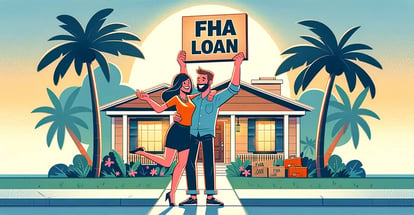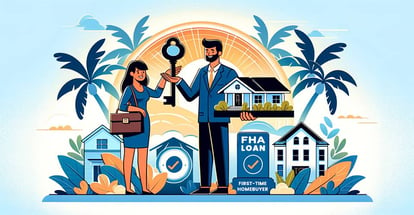EVERY FHA Government Program for Florida Homebuyers - Ultimate Guide
Federal Housing Administration (FHA) programs offer various mortgage options designed to help different types of homebuyers. These programs are particularly useful for buyers who might not qualify for conventional loans. FHA programs usually come with more flexible credit requirements and potentially lower down payments.
The purpose of this guide is to give you a comprehensive overview of each FHA program available to homebuyers in Florida.
You'll find details on the unique benefits, ideal candidates, and qualification and eligibility criteria for each program. This guide aims to be a one-stop resource to help you make an informed decision about which FHA program best suits your needs.
All FHA programs share some universal benefits and requirements that make them accessible options for a variety of homebuyers.
Generally, FHA programs offer the advantage of lower down payments, often as low as 3.5%. They also come with more lenient credit qualifications, making them a good fit for those who might not meet the stricter standards of conventional loans.
Additionally, FHA programs can be used to purchase a range of property types, from single-family homes to multi-unit dwellings.
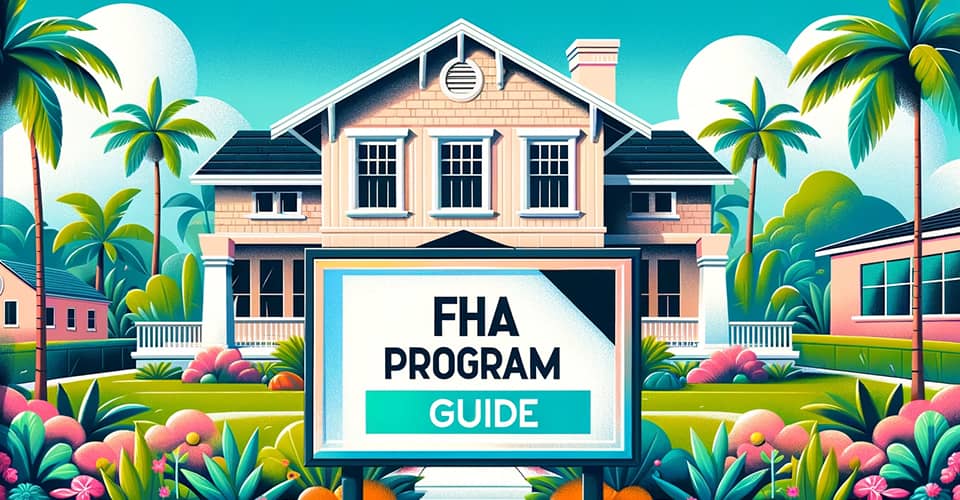
However, there are some universal requirements to keep in mind. These include the necessity to pay mortgage insurance premiums, adhere to program-specific loan limits which can vary by county, and ensure the property meets certain safety, security, and soundness standards through an appraisal.
Now, lets go each program one by one, and find which one is best suited for your unique situation.
Table of Contents
- CALCULATE Your Minimum Down Payment to Buy a House with an FHA Loan Program
- FHA Basic Home Mortgage Loan 203(b)
- FHA Home Mortgage Rehab Loan 203(k)
- HUD Good Neighbor Next Door Program
- FHA Energy Efficient Mortgage
- FHA Condo Loan Program
- FHA Cash Out Refinance Program
- FHA Adjustable Rate Mortgage Program
- FHA Manufactured Home Loan & Lot Program
- FHA Reverse Mortgage Program
- FHA Section 248 Indian Reservation Program
- FHA Streamline Refinance
- FHA Limited Refinance Program
- FHA Disaster Victims Mortgages 203(h) Program
- FHA Hawaiian Homelands Program
CALCULATE Your Minimum Down Payment to Buy a House with an FHA Loan
Use our custom calculator to see how much money you'd need to save for a down payment on a house. MakeFloridaYourHome helps you find the best down-payment-assistance program available and combine it with the perfect FHA loan program to save you as much money as possible.
Disclaimer - Hometown Heroes Rewards Calculator is for educational, estimation and illustrative purposes only. The estimates are based on information you provide. Qualification may require additional information. Please consult with a licensed mortgage professional for personalized advice and information regarding your specific scenario. This is not a commitment to lend.
FHA Basic Home Mortgage Loan 203(b)
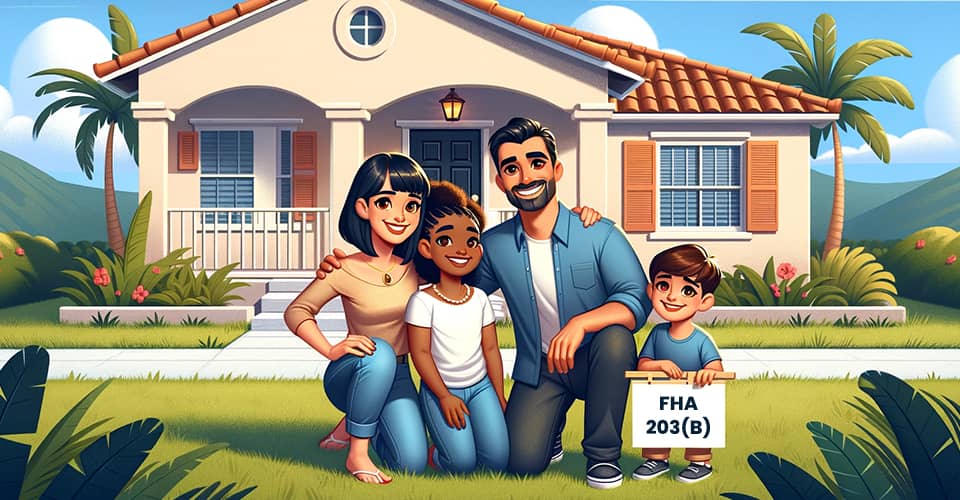
Unique Benefits
The FHA 203(b) loan offers two major benefits. First, it comes with a low down payment requirement. Eligible borrowers may only need to put down as little as 3.5% of the home's value, allowing them to finance up to 96.5% of the property.
Second, the program has easier credit requirements. While many lenders require a minimum credit score of 580, the FHA itself requires a minimum of just 500, although a higher down payment would be necessary.
Who It's Perfect For
The FHA 203(b) loan is ideal for first-time homebuyers who benefit from the low down payment requirement. It's also well-suited for people with lower credit scores who may find it hard to qualify for conventional loans.
Real-estate investors and current homeowners looking for refinancing options can also consider this loan, as long as they intend to use the property as a primary residence.
Qualification and Eligibility
For credit score requirements, a minimum score of 580 is commonly required by lenders, but the FHA allows for scores as low as 500 with a 10% down payment. In terms of income, your debt-to-income ratio (DTI) should generally be 57% or less.
Other qualifications include property limitations; you can only finance one- to four-unit structures like single-family homes, duplexes, triplexes, and quadplexes.
The property must also fall within FHA loan limits, which for one-unit properties in 2023, range from $472,030 to $1,089,300. Additionally, borrowers are required to pay mortgage insurance, either upfront at closing or financed into the loan.
By meeting these requirements, borrowers can take advantage of the FHA 203(b) loan's less stringent qualifications compared to conventional loans.
If you find you don't meet these requirements, you might want to focus on improving your financial status, such as boosting your credit score or lowering your DTI, before applying.
FHA Home Mortgage Rehab Loan 203(k)
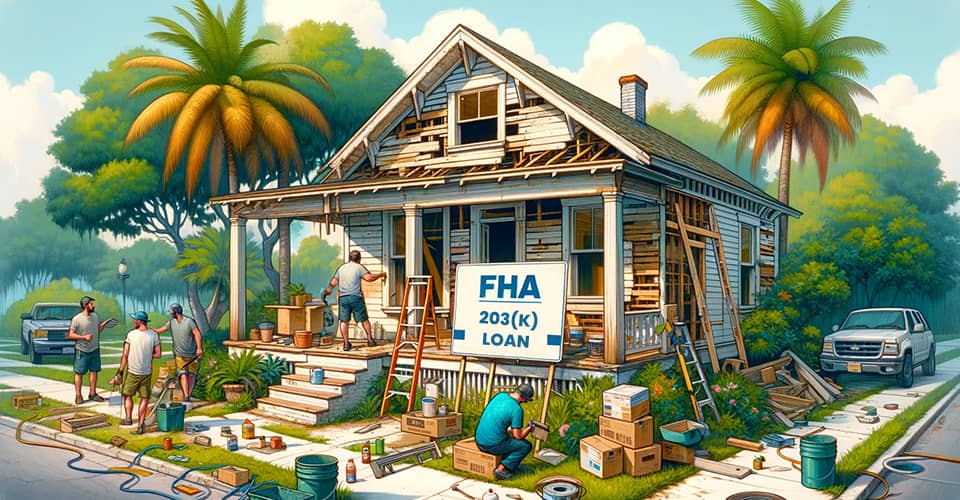
Unique Benefits
The FHA 203(k) loan has two unique features that set it apart. First, it allows you to finance both the purchase of a home and the cost of its repairs through a single mortgage.
Second, it's available as either a fixed or adjustable-rate loan, covering both material and labor costs for renovations.
Who It's Perfect For
This type of loan is ideal for buyers interested in purchasing homes that require significant repairs or renovations, commonly known as "fixer-uppers."
It's also suitable for real estate investors who are looking to rehab a property, as long as they plan to reside in it as their primary home. Existing homeowners interested in renovating their current residence may also find this loan useful.
Qualification and Eligibility
To qualify for an FHA 203(k) loan, lenders usually require a minimum credit score of 500, though many prefer scores of 580 or higher. Additionally, your debt-to-income ratio (DTI) should not exceed 43%.
A down payment of 3.5% is required for those with a credit score of 580 or above, and 10% for those with scores between 500 and 579.
The loan must be used for your primary residence and the property must fall within FHA loan limits, which in 2023 are between $472,030 and $1,089,300 for single-family homes.
Renovations should also be carried out by a licensed contractor, not the borrower. Documentation verifying your identity, income, debts, and credit score will be required during the application process.
HUD Good Neighbor Next Door Program
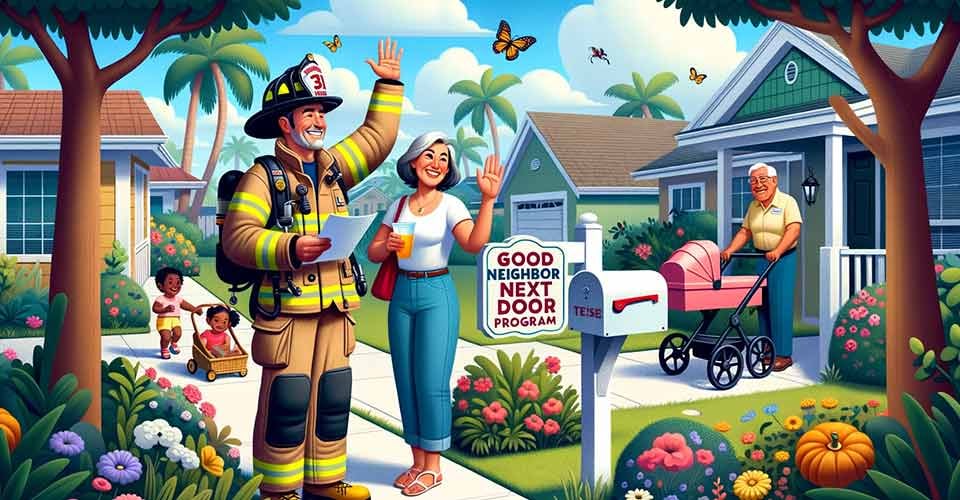
Unique Benefits
-
50% Discount on Home Price - One of the main attractions of the Good Neighbor Next Door program is that it offers homes at half the listing price.
- No Down Payment - This program allows for no down payment, which can be a significant financial relief for buyers.
Who It's Perfect For
-
Teachers - Those who are full-time teachers serving students in the area where the home is located can benefit from this program.
- First Responders - Law enforcement officers, firefighters, and emergency medical technicians working full-time are eligible.
Occupational Requirements
-
Teachers - Must be a full-time teacher at a state-accredited public or private school, serving students in the area where the home is located. Administrators and other school employees are not eligible.
-
Police and Law Enforcement - Must be a full-time employee of a law enforcement agency and sworn to uphold and make arrests for law violations. Must also serve the area where the home is located.
-
Firefighters - Must work at least 40 hours per week for a government-backed fire department and serve the local area where the home is located.
- Emergency Medical Technicians (EMTs) - Must work at least 40 hours per week for an Emergency Medical Services responder unit and serve the local area where the home is located.
Residency Requirements
-
Must purchase a single-family home within a HUD revitalization area.
-
The home must be the buyer's primary residence for at least 36 months.
- Must not have owned a home within 12 months prior to making an offer.
FHA Energy Efficient Mortgage
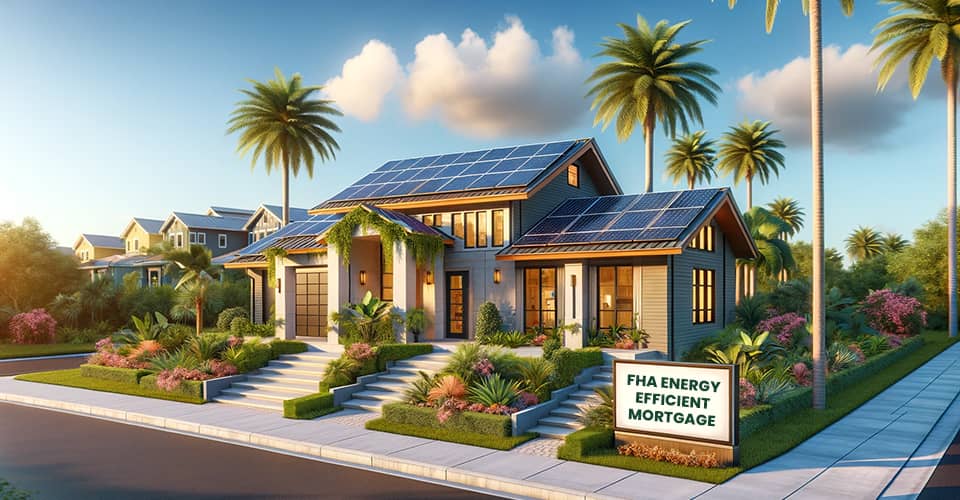
Unique Benefits
-
Additional Financing for Energy Improvements - This program allows borrowers to include the cost of energy-efficient improvements in their mortgage, eliminating the need for a separate loan for these upgrades.
- No Additional Qualifications - If you qualify for an FHA loan, you are automatically eligible for the Energy Efficient Mortgage program.
Who It's Perfect For
-
Environmentally Conscious Buyers - Those interested in reducing their carbon footprint will find this program useful for making energy-efficient upgrades.
- Homeowners Looking to Save on Utility Bills - The improvements financed through this program are intended to lower monthly utility expenses.
Qualification and Eligibility
-
A home energy rating system or a qualified energy consultant must determine the cost of adding energy-efficient features and estimate the energy savings.
- Up to $200 of the cost of the energy inspection report can be included in the mortgage.
How to Apply
-
Check Eligibility - Ensure you meet the income requirements for FHA’s Section 203(b) and can make monthly mortgage payments.
-
Energy Audit - Get an audit from a home energy rating system or a qualified energy consultant to estimate costs and savings.
-
Choose Improvements - Decide on energy-efficient upgrades that meet eligibility criteria.
-
Apply for Loan - Submit your loan application, including the added amount for the energy-efficient upgrades.
- Loan Approval and Upgrade - Upon loan approval, you can proceed with the energy-efficient improvements.
FHA Condo Loan Program
By using the FHA Condo Loan Program, you can benefit from easier condo financing, lower rates, and a more streamlined approval process, particularly if you meet the specified qualifications and the condo association is FHA-approved.
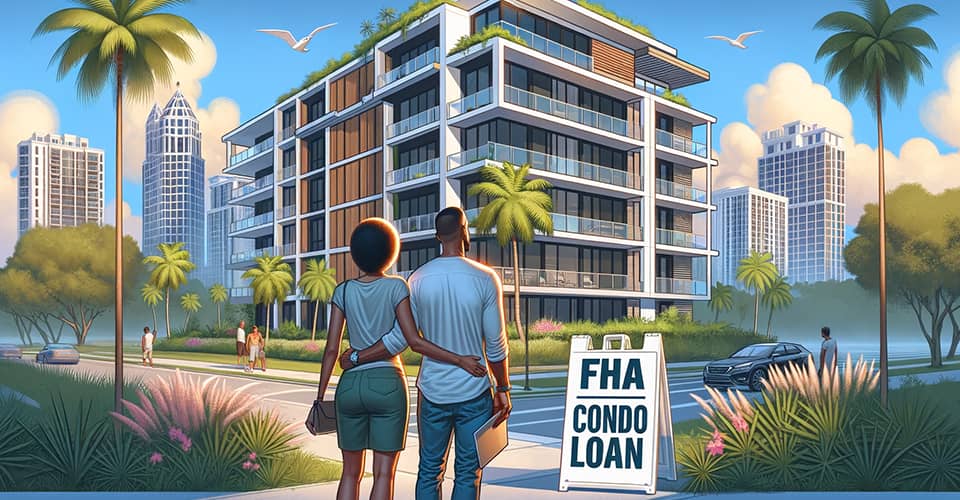
Unique Benefits
-
Easier Condo Financing - Specifically designed for condominium purchases, making it easier for buyers to secure financing for this type of property.
- Lower Rates - Typically offers lower interest rates compared to conventional condo loans.
Who It's Perfect For
-
Condominium Buyers - Anyone looking to buy a condo unit can benefit from the specialized structure of this loan.
- Urban Dwellers - Ideal for people who prefer to live in city centers where condominiums are more prevalent.
Qualification and Eligibility
-
Condo Association Approval - The condominium building must be approved by the FHA. It must contain at least four dwelling units and can include various types of structures like detached units, row houses, and elevator buildings.
- Occupancy Rules - Eighty percent of FHA mortgages in the project must be made to owner-occupants. Intended occupants must plan to use the condo as their principal residence.
How to Apply
-
Check Eligibility - Make sure you meet FHA underwriting criteria and plan to occupy the condo as your primary residence.
-
Condo Association Approval - Ensure the condo association and building meet FHA requirements.
-
Apply for Loan - Submit your loan application. You can finance up to 96.5% of the home loan, and some closing costs can also be folded into the loan.
- Await Approval - Once approved, you can proceed with the purchase.
Restrictions
If the condo is in a building converted from rental housing, FHA insurance through Section 234(c) will only be provided if:
-
The conversion happened more than one year prior to insurance application.
-
The potential buyer or co-buyer was a tenant in the rental housing.
- The conversion is sponsored by a tenant’s organization representing a majority of households in the project.
FHA Cash Out Refinance Program
A cash-out refinance lets homeowners refinance their mortgage and receive a lump sum of cash. You do this by taking out a loan that is larger than your current mortgage balance.
For example, if you owe $150,000 on your mortgage, you could refinance to a $200,000 loan, pay $4,500 in closing costs, and take home $45,500 in cash.
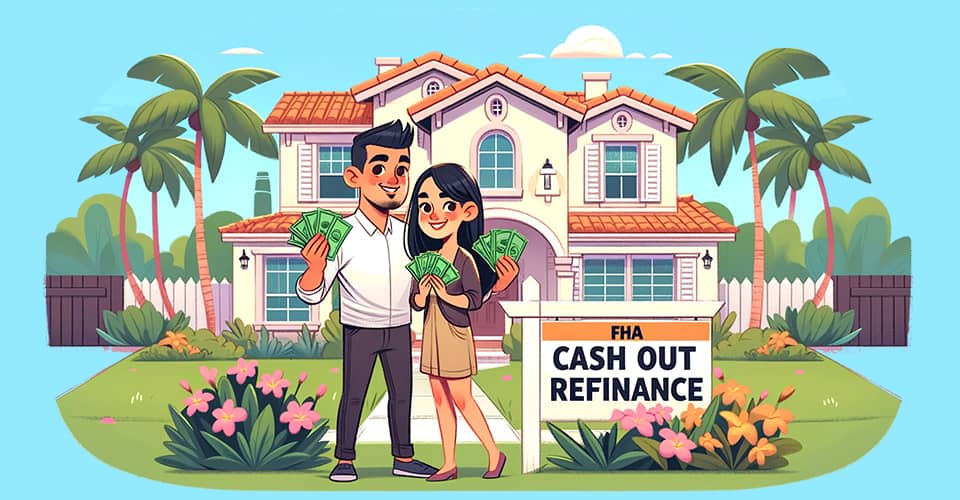
Unique Benefits
-
High LTV Ratios - Allows you to borrow up to 80% of your home's value.
- Fixed Interest Rates - Offers stable monthly payments.
Who It's Perfect For
-
Homeowners Needing Cash - Ideal for those looking to finance renovations or other large expenses.
- Debt Consolidation - Useful for those wanting to pay off high-interest debts.
Qualification and Eligibility
By meeting these criteria, you can refinance your mortgage, potentially lower your interest rate, and take out cash for various needs.
-
Existing FHA Loan - Not required. You can apply even if you have a conventional loan or no mortgage.
-
Credit Score Minimum - Varies by lender, usually a minimum of 580 for debt consolidation and 620 for other purposes
- Loan-to-Value (LTV) Ratio - Up to 80% is allowed. If your home is worth $200,000, you could take out a new loan of $160,000.
Available Assistance
-
The cash can be used for any purpose, including home improvements, paying off debts, or financing education.
- FHA-insured loans often have lower interest rates, making them attractive to homeowners with lower credit scores.
Restrictions
-
Mortgage insurance premiums (MIP) will be required.
-
You must live in the home for at least 12 months before applying.
- No late mortgage payments in the last 12 months.
FHA Adjustable Rate Mortgage Program
An FHA Adjustable Rate Mortgage (ARM) offers an initial interest rate that is usually lower than that of a fixed-rate mortgage. This initial rate is locked in for a set period, often 5 or 7 years.
After that, the rate will adjust annually, based on market conditions. There is a cap to limit how much the rate can increase, both annually and over the life of the loan.
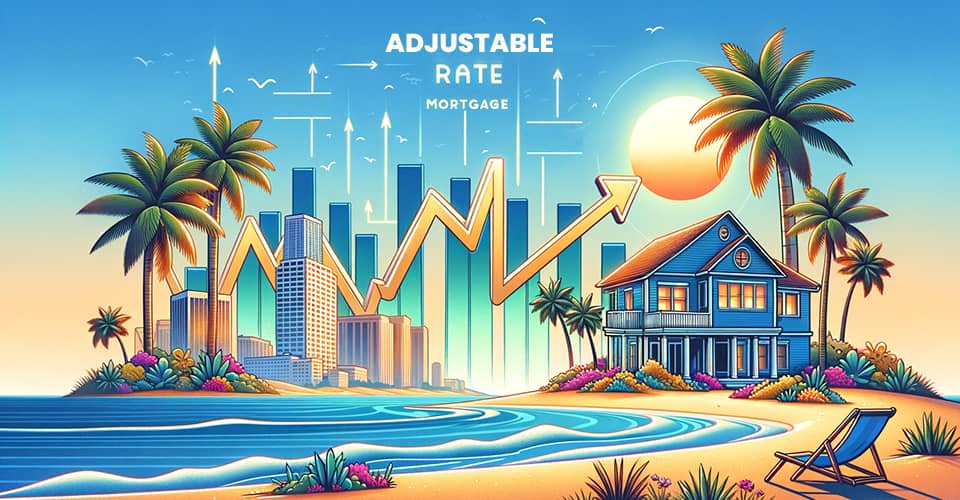
Unique Benefits
-
Lower Initial Rates - Initial interest rates are typically lower than fixed-rate mortgages.
- Cap on Rate Increases - There's a limit on how much the interest rate can increase over the life of the loan.
Who It's Perfect For
-
Short-term Homeowners - Ideal for those planning to sell or refinance before rates go up.
- Buyers Expecting Income Growth - Suitable for those expecting an income rise that will allow them to handle potential rate increases.
Qualification and Eligibility
-
Credit Score - Varies by lender, but typically a minimum of 580 is required.
- Adjustable Rate Terms - Usually offered in terms like 5/1 or 7/1, meaning the rate is fixed for the first 5 or 7 years and then adjusts annually.
Available Assistance
-
ARMs can provide initial monthly payment relief compared to fixed-rate options.
- The cap on rate increases offers some protection against extreme rate hikes.
Restrictions
-
Rates can increase, potentially making future monthly payments higher.
- Not ideal for those planning to stay in the home long-term without refinancing.
FHA Manufactured Home Loan & Lot Program
FHA approved lenders make loans for manufactured homes and/or lots. These are not government loans or grants, but FHA insures the lenders against loss if you default. Interest rates are fixed and negotiated between you and the lender.
The loan can be used for purchasing or refinancing a manufactured home, a developed lot, or both. The home has to be your primary residence.
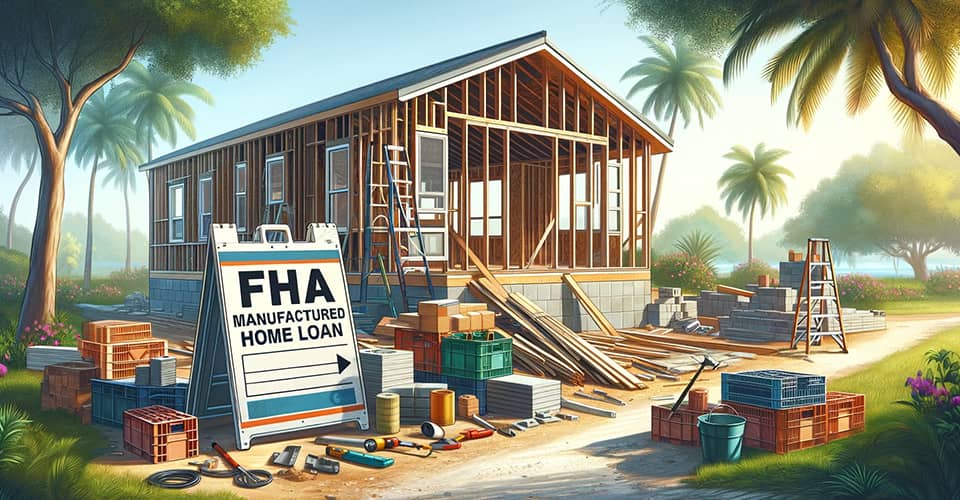
Unique Benefits
-
Financing for Manufactured Homes - Loans are available for purchasing or refinancing a manufactured home.
- Financing for Lots - You can also get a loan for a developed lot on which to place the home.
Who It's Perfect For
-
Manufactured Home Buyers - Those looking to purchase a manufactured home.
- Rural Residents - People living in rural areas where traditional homes might not be as accessible.
Qualification
-
Home Specifications - The home must meet Model Manufactured Home Installation Standards.
-
Land Ownership - You can either own the land or lease it, lease terms must be at least 3 years and provide a 180-day advance written notice for termination.
- Consumer Protection - You have to sign a HUD Placement Certificate confirming that the home meets your standards.
Loan Amount and Term
-
Manufactured home only - $69,678
-
Manufactured home lot - $23,226
-
Manufactured home & lot - $92,904
-
Loan term for manufactured home or single-section home and lot - 20 years, plus 32 days
-
Loan term for manufactured home lot - 15 years, plus 32 days
- Loan term for multi-section manufactured home and lot - 25 years, plus 32 days
Eligibility
-
Sufficient down payment.
-
Adequate income for payments and other expenses.
-
Intention to make the manufactured home your principal residence.
- A suitable site that meets local standards and has proper water and sewage facilities.
FHA Reverse Mortgage Program
In a reverse mortgage, the lender pays you by converting a portion of your home equity into cash. You don't have to pay back the loan as long as you live in the home. The loan becomes due when you sell the home, move out, or pass away.
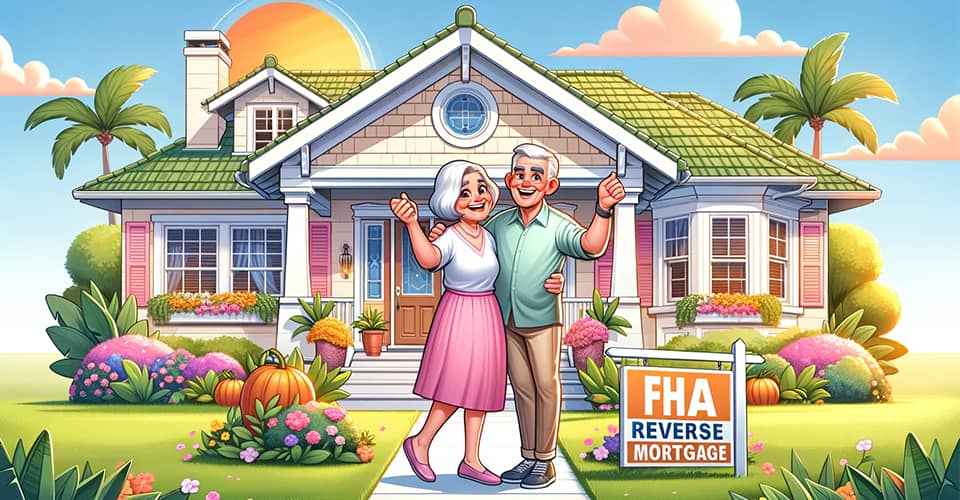
Unique Benefits
-
Convert Home Equity to Cash - Allows you to turn a portion of your home's equity into cash.
- No Monthly Payments - Unlike traditional loans, you don't have to make monthly payments. However, you must continue to pay property taxes, insurance, and maintenance for your home.
Who It's Perfect For
-
Seniors - Individuals aged 62 or older.
- Retirees - Those who are retired and looking for additional income.
Qualification
-
Age Requirements - You must be at least 62 years old to qualify.
- Home Equity - You should have sufficient home equity, which will be determined by the lender.
Loan Repayment
The loan needs to be repaid in full, including interest and other charges, when the last surviving borrower sells the home, moves out, or passes away. The repayment amount cannot exceed the value of the home.
Eligibility Requirements
-
You must live in the home as your primary residence.
-
You must have enough equity in your home.
- Your home must meet Federal Housing Administration (FHA) guidelines and standards.
FHA Section 248 Indian Reservation Program
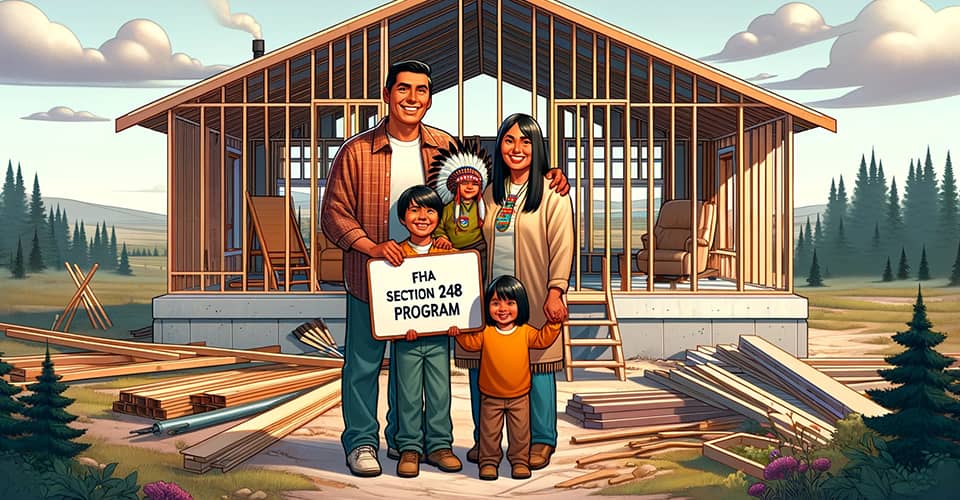
Unique Benefits
-
Low Down Payment - About 97% financing available. You can also receive a gift to cover the down payment.
- Flexible Qualifications - Standard FHA credit qualifications apply. Closing costs can also be financed or covered through various means.
Who It's Perfect For
-
Low-Income Families - Standard FHA credit qualifications mean you don't need a high income to qualify.
- Buyers with Limited Credit - If you meet FHA credit qualifications, your limited credit history won't be a major hindrance.
Qualification and Eligibility
-
Income and Credit - Must meet standard FHA credit qualifications. A loan officer can guide you through income limits and qualifications.
-
Property Standards - Home must meet FHA property standards, including water, sewer, and electrical systems. An FHA appraiser will assess the property.
- Tribal Land Rules - The property must be on tribal land and you may need a tribal-approved lease. The tribe must also participate in the program for it to operate.
How to Apply
-
Contact a Loan Officer - Find an FHA-approved lender, like a bank or mortgage company. They will help you understand if you qualify and what steps you need to take.
-
Property Requirements - Whether you're buying or building, the home must meet FHA property standards. An FHA appraiser will evaluate the property, and if you're building, plans must be FHA-approved.
-
Lease and Tribal Participation - If you're building or buying on tribal land, you'll need a lease approved by your tribe and by FHA. The tribe must actively participate in the program.
- Resale Conditions - If you sell the home, your tribe must approve the next buyer. In case of foreclosure, the home will try to be resold to a qualified Indian family with tribal approval.
FHA Streamline Refinance
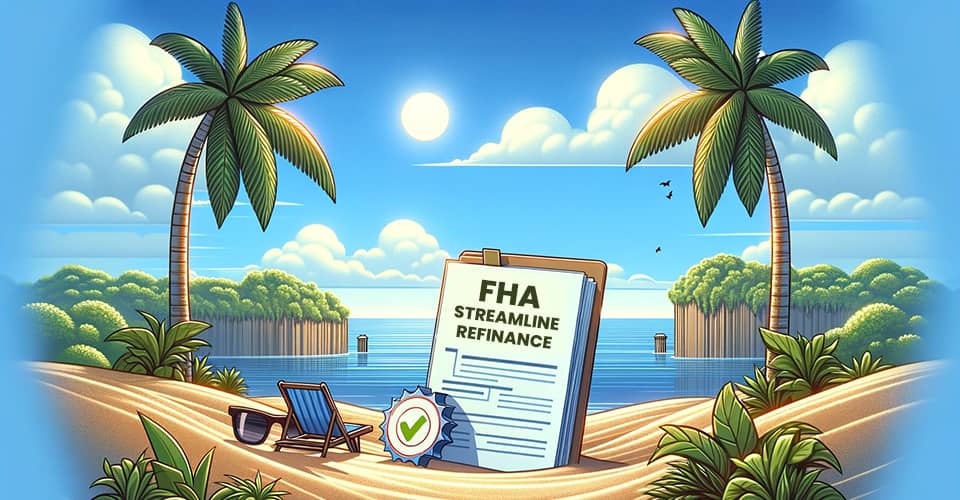
Unique Benefits
-
Simplified Process - Less paperwork and faster approval times compared to a traditional refinance.
- No Appraisal Needed - You don't need a property appraisal, which saves time and money.
Who It's Perfect For
-
Current FHA Loan Holders - If you already have an FHA loan, this is the most straightforward way to refinance.
- Quick Refinancing - Ideal for those who want to refinance without the usual hassle, quickly and efficiently.
Qualification and Eligibility
-
Existing FHA Loan - You must have an existing FHA loan to be eligible for Streamline Refinance.
- On-time Payments - You must have a history of making your mortgage payments on time.
How to Apply
-
Check Eligibility - Make sure you have an existing FHA loan and that you've been making payments on time.
-
Find a Lender - Choose an FHA-approved lender to facilitate the Streamline Refinance process.
- Submit Application - Your lender will guide you through the application, which is simplified compared to traditional refinancing.
By meeting these qualifications and following these steps, you can make use of the FHA Streamline Refinance program to refinance your existing FHA loan with less hassle.
FHA Limited Refinance Program
The FHA Streamline Refinance Program is designed for quick refinancing and typically requires that you already have an FHA loan with a good payment history. It offers a simplified process with no need for property appraisal.
On the other hand, the FHA Limited Refinance Program is focused on helping current FHA loan holders lower their monthly payments, also without the need for a property appraisal.
While both programs aim to simplify the refinancing process, the Streamline program is more geared towards quick refinancing, and the Limited program is tailored for those looking to reduce monthly payments.
Both require that you have an existing FHA loan and are current on your payments.
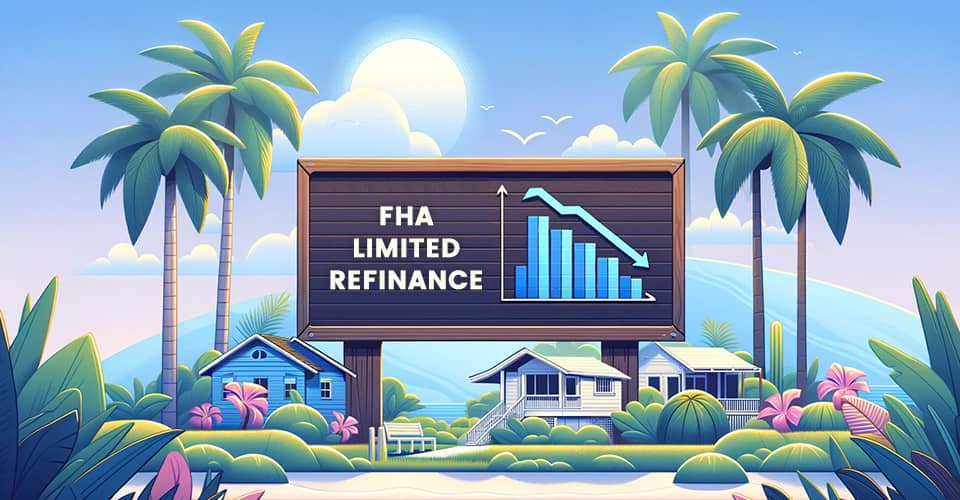
Unique Benefits
-
No Appraisal - Eliminates the need for a property appraisal, saving time and money.
- Minimal Paperwork - Fewer forms and documents are needed, streamlining the application process.
Who It's Perfect For
-
Current FHA Loan Holders - If you already have an FHA loan, this program is designed to make refinancing easier.
- Lowering Monthly Payments - Ideal for those looking to reduce their current monthly mortgage payments.
Qualification and Eligibility
-
No Delinquencies - You must be current on your existing FHA loan payments.
- Credit Score - A certain minimum credit score may be required, depending on the lender.
How to Apply
-
Check Eligibility - Ensure you meet the qualifications, including no payment delinquencies and an appropriate credit score.
-
Find a Lender - Select an FHA-approved lender for the Limited Refinance Program.
- Submit Application - The lender will guide you through the streamlined application process.
By satisfying these criteria and following these application steps, you can utilize the FHA Limited Refinance Program to refinance your current FHA loan with less complexity.
FHA Disaster Victims Mortgages 203(h) Program
To apply, submit your application for mortgage insurance to an FHA-approved lender within one year of the President's disaster declaration.
The application process can be expedited through the lender's Direct Endorsement provision, which allows them to process applications without needing to send paperwork to HUD.
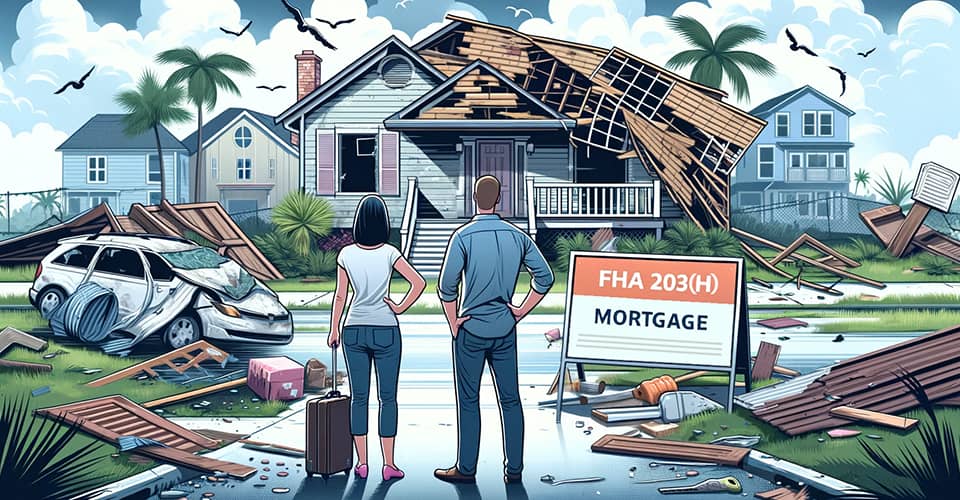
Unique Benefits
-
Fast Approval - The 203(h) program is designed for quick approval to help disaster victims recover as soon as possible.
- No Down Payment - Borrowers are eligible for 100 percent financing, meaning no down payment is required.
Who It's Perfect For
-
Disaster Victims - This program is specifically for those whose homes have been destroyed or severely damaged in a Presidentially declared disaster area.
- Rebuilding After Loss - It's ideal for individuals who are either rebuilding their destroyed home or buying another home as their principal residence.
Qualification and Eligibility
-
Federal Disaster Area - Your home must be located in an area declared by the President as a disaster area.
- Proof of Loss - Your home must have been destroyed or damaged to an extent that reconstruction or replacement is necessary.
FHA Hawaiian Homelands Program
This program works to overcome traditional barriers to financing on Hawaiian home lands by offering FHA-insured loans.
This insurance reduces the lender's risk, making it easier for Native Hawaiians to obtain a mortgage for homes on leased lands. To apply, you must go through an FHA-approved lender.
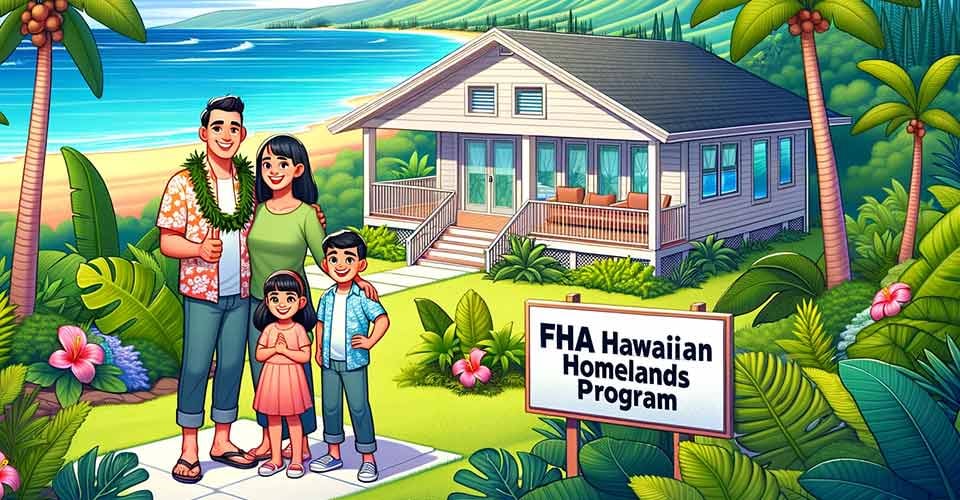
Unique Benefits
-
Low Rates - The program offers competitive interest rates to make homeownership more affordable.
- Leasehold Financing - Since the property is on leased land, traditional financing options are often limited. This program provides a way to finance such properties with FHA backing.
Who It's Perfect For
-
Native Hawaiians - This program is designed specifically for individuals of Native Hawaiian descent.
- Eligible Leased Lands - The loans are for properties located on Hawaiian home lands, which are leased lands provided by the Department of Hawaiian Homelands (DHHL).
Qualification and Eligibility
-
Native Hawaiian Descent - To qualify, you must have not less than one-half part Native Hawaiian blood or meet other established criteria for succession under Section 209 of the Hawaiian Homes Commission Act, 1920.
- Land Lease Agreement - The property must be on a homestead lease granted by the DHHL.
With over 50 years of mortgage industry experience, we are here to help you achieve the American dream of owning a home. We strive to provide the best education before, during, and after you buy a home. Our advice is based on experience with Phil Ganz and Team closing over One billion dollars and helping countless families.

About Author - Phil Ganz
Phil Ganz has over 20+ years of experience in the residential financing space. With over a billion dollars of funded loans, Phil helps homebuyers configure the perfect mortgage plan. Whether it's your first home, a complex multiple-property purchase, or anything in between, Phil has the experience to help you achieve your goals.


 By
By  Edited by
Edited by 





